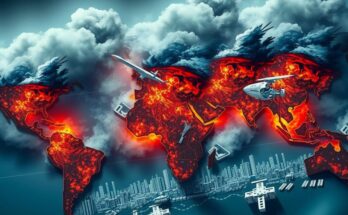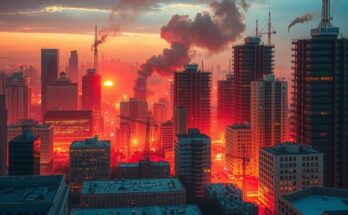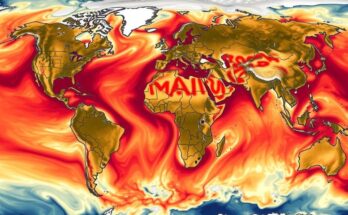Bangladesh faces substantial climate threats, including floods and land erosion, as it ranks ninth for climate disaster risk globally. Despite minimal contributions to greenhouse gas emissions, the country is set to lose significant agricultural land by 2050. Climate change consequences are unevenly distributed, with wealthier nations able to better cope than those in the Global South, a situation described as climate apartheid. Historic emissions from the Global North continue to overshadow developing nations’ plight, demanding urgent action and support from wealthier countries to address these disparities.
The ongoing climate crisis has hit Bangladesh hard, manifesting in relentless rains, flash floods, and devastating land erosion. These conditions were anticipated by scientists decades ago and reflect not mere speculation but the grim reality of our changing climate. According to the World Risk Index 2023, Bangladesh ranks ninth globally for climate disaster risk, with projections indicating a loss of 30 percent of its arable land by 2050 due to rising sea levels. This scenario poses a significant threat to rice production, a dietary staple, ultimately jeopardizing food security and increasing the likelihood of famine, unemployment, and poverty in a country already burdened by an overwhelming population. Despite contributing less than 0.1 percent to global greenhouse gas emissions since its independence in 1971, Bangladesh is on the brink of environmental disaster. The melting Himalayan glaciers threaten its vital river systems, leading to catastrophic flooding. Unfortunately, the Bangladeshi government has struggled to develop effective policies to combat these climate change effects, a situation exacerbated by the nation’s unstable political climate. Globally, the impact of climate change disproportionately affects marginalized nations, with wealthier countries often insulated from the worst consequences. This stark disparity highlights what some may describe as climate apartheid, where affluent nations possess the resources to adapt and mitigate climate risks, while the Global South, such as Bangladesh, faces dire circumstances. For instance, the Netherlands, which shares a deltaic geography with Bangladesh, demonstrates significant infrastructure resilience against rising sea levels, contrasting sharply with Bangladesh’s lack of preparedness. Moreover, within Bangladesh, evidence of climate injustice is apparent. Recent floods in the wealthier region of Feni received substantial aid, while lesser-known areas like Sherpur were neglected. This inequitable distribution of support underscores that vulnerability to climate change is not universally experienced; rather, it is shaped by socioeconomic factors. The narrative surrounding climate responsibility remains flawed, as the Global North continues to bear the majority of historic greenhouse gas emissions—approximately 92 percent over the last two centuries. Yet, developing nations are often blamed for the consequences of the climate crisis while being pressured to limit their industrial growth, which significantly hampers their potential for economic advancement. While immediate reductions in greenhouse gas emissions are necessary, the Global North must fulfill its commitments to support developing nations financially. Instead of providing essential technology and funding, these countries often impose restrictions and accountability measures that stifle growth in the Global South. Furthermore, many purportedly environmentally conscious countries maintain polluting industries in these regions under the guise of sustainability, thus perpetuating environmental injustice. The urgent need for Bangladesh to prioritize climate action is underscored by United Nations reports predicting that between 2030 and 2050, climate change could result in the deaths of 250,000 individuals annually. This is not merely an environmental concern; it poses direct threats to human rights, making it imperative for the global community to act swiftly and justly.
The topic of climate crisis, particularly its impact on Bangladesh, is crucial in understanding the intersection of environmental degradation and socioeconomic challenges faced by developing nations. Bangladesh, despite its negligible contribution to global greenhouse gas emissions, is among the most vulnerable countries to climate threats. Rising sea levels and extreme weather patterns have already resulted in significant loss of arable land and increased instances of flooding. As a nation largely dependent on agriculture and densely populated, Bangladesh is at the forefront of food security issues, potential famine, and a broader humanitarian crisis driven by environmental change. Furthermore, the narrative surrounding climate justice highlights the disparity in impact based on economic status, urging a re-evaluation of responsibilities among nations in the context of this global crisis.
In summary, the climate crisis presents an existential threat to Bangladesh, with far-reaching implications for agriculture, food security, and overall societal stability. As the effects of climate change disproportionately affect the Global South, the need for a collaborative approach to climate action is urgent. Wealthier nations must take responsibility for their historical emissions and engage in meaningful dialogue and action to support vulnerable nations like Bangladesh. Without significant and immediate intervention, the consequences of climate change will continue to escalate, underscoring the need for systemic change both locally and globally.
Original Source: asianews.network




